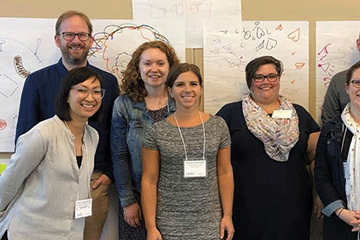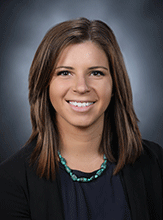
05/18/2021
SUNY Cortland Assistant Professor of English Danica Savonick recently won two prestigious awards that will help her explore how four influential, activist women writers of the late 1960s and early 1970s were also radically innovative teachers.
The awards will help defray expenses while she finishes her forthcoming book, Insurgent Knowledge: The Poetics and Pedagogy of Toni Cade Bambara, June Jordan, Audre Lorde, and Adrienne Rich in the Era of Open Admissions.
All four women achieved fame and influence as writers and were involved in feminist and anti-racist movements. All four also taught and collaborated at Harlem’s City College of New York, the founding institution of the City University of New York (CUNY) system.
While these authors are often studied for their writing, it’s the archival syllabi, lesson plans and assignments that captured Savonick’s attention for how they revealed their creative methods of teaching students to advocate for social change.
“I’m looking at the work that they did with students in the classrooms, their teaching methods, and how they were developing innovative, student-centered, and engaged teaching practices that were inspired by their activism,” said Savonick, who earned her own doctorate through CUNY.

Insurgent Knowledge will suggest that some of today’s common teaching practices were central to the work of these teacher-poets, especially during CUNY’s historic open admissions experiment from 1970 to 1976. The authors were teaching working-class students and students of color in the nation’s first state-mandated educational opportunity program (SEEK) during this revolutionary moment in educational history.
Savonick’s work in this area impressed the American Council of Learned Societies (ACLS), a federation of 78 organizations dedicated to supporting work in humanities and the social sciences for public good, which gave her a yearlong ACLS fellowship in which to complete Insurgent Knowledgeand possibly explore a new project. The fellowship will span the spring and fall semesters of 2022. The ACLS considered approximately 1,300 applications before naming Savonick among the 60 successful applicants.
Savonick also received a Dr. Nuala McGann Drescher Award, which will help cover her fall 2021 expenses so she can work on the manuscript. The award, usually presented to only two SUNY faculty members in New York state per year by the faculty and staff labor union United University Professions, supports faculty projects related to diversity and inclusion.
The first complete manuscript draft will likely be sent to Savonick’s editor with Duke University Press this fall, she said. She plans to spend next spring making revisions and sending out the revised draft to official peer reviewers. and anticipates her further revisions will take her into the fall 2022 semester.
“Publishing this research will help establish my reputation as an expert in the field of 20th century literary and cultural studies,” Savonick said. “More importantly, though, I hope that this research will help us do a better job fighting for public education and inspiring our students to advocate for change.”
The four women’s contributions to teaching and education are largely unrecognized, even though they served as the foundation for many of today’s common practices, she said.
“They would do things like having students do collaborative final projects instead of writing a term paper. It’s common now, but I don’t think that we’ve realized some of the historical context in which some of these practices emerged. These four women were not cited or credited for developing these teaching methods. That’s an important aspect of this project, too.
“At the same time, I’m looking at how their classroom teaching impacted the literature they were writing during this period,” she said. “I explore how these classrooms inspired many insights now associated with intersectional feminism.
“I am also trying to think about their work as educational activists who were involved in the movement for a free college and how college could be tuition-free,” Savonick said. “I’m looking at all of those different things.”
Insurgent Knowledge thus reveals how these renowned authors were also transformative teachers and educational activists, whose experiences in public universities fundamentally altered the course of American literature, Savonick said.
There’s a chance the project will involve return trips to the two sources of much of her manuscript material — lesson plans and course syllabi of the authors — at the Schlesinger Library of the Radcliffe Institute for Advanced Studies, Harvard University, in Cambridge, Massachusetts, and at the Spelman College archives in Atlanta, Georgia.
“I do have a few lingering questions,” she said.
Savonick conceived the idea to write about these authors while she was herself researching at CUNY’s Queens College as a doctoral candidate in English at the CUNY Graduate Center.
“Word gets passed down and circulated and everyone heard that I was interested in teaching and feminist literature more broadly,” she said. “Someone said, ‘Adrienne Rich used to teach at CUNY,’ and pointed me towards Rich’s essay, ‘Teaching Language in Open Admissions.’”
“So I started tracking down the essays and poems they wrote whilst they were at CUNY. I started with materials where they were actually writing about their experiences at CUNY. These were less-read and studied materials, not the most famous essays and poems. But if you searched a little bit, they were all there. So it was kind of like piecing together the puzzle, because they would reference each other’s work. I would go track down a poem that was mentioned in an essay by one of them, and find something written by another. Also, their archival materials were kind of mixed, so I would go to the materials for one author and then find those of another author, and it kind of evolved from there.”